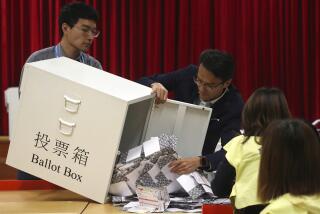Hong Kong Eases Residency Fears
- Share via
HONG KONG — Thousands of people are coming here to witness Hong Kong revert to Chinese rule July 1. Thousands more are glad they don’t have to.
Hong Kong citizens who are living overseas but want to keep their residency rights will not be required to be in Hong Kong on the day of the hand-over, China’s State Council has declared, and Hong Kong officials are trying to spread the word.
“We’ve sent people around the world to explain the new rules,” said Joseph Cheung, a Hong Kong government spokesman. “People have to come back, but not right away. There’s still a lot of confusion.”
Hong Kong people who want to keep the right to vote, work without a visa or run for office here will have an 18-month grace period to return to the territory to claim residency. They can leave again but must not stay away for more than a three-year stretch. Students and workers posted overseas are exempted, the government says.
Before the new rules were announced in April, uncertainties over residency status had triggered a rush for flights back to the territory by thousands of the nearly 750,000 Hong Kong Chinese who live overseas or hold foreign passports.
“Six to nine months ago, all the flights were booked,” said Edin Yeung, an agent at Hong Kong’s Aero Travel. “The airlines were adding surcharges and making people buy their tickets as soon as they made the reservations. It was out of control.”
Since the announcement, he said, many seats have come back on the market and the prices have dropped.
Immigration and nationality issues have been contentious topics of negotiation between Hong Kong’s present and future governments. After the 1989 crackdown on pro-democracy protesters in Beijing’s Tiananmen Square, hundreds of thousands of Hong Kong citizens scrambled to obtain foreign passports to ensure that they could leave the territory if life under Chinese rule turned sour.
Many of those who left Hong Kong have been lured back by its booming economy and hopes for a smooth transition. Vivian Cheung, a 29-year-old banker who had been living in Britain, returned to Hong Kong before the new regulations were announced to guarantee that she could keep her citizenship.
“I decided to come back just in case,” she said Monday. “We had heard rumors about the July 1 deadline to come back, but nobody knew for sure.”
An estimated 400,000 Hong Kong-born residents in this city of 6.3 million hold foreign citizenship. The Chinese government has announced that they must declare their foreign citizenship and relinquish their Chinese citizenship--which Beijing insists is the nationality of all ethnic Chinese born in Hong Kong--to claim consular protection from their adopted homelands.
Doing so, however, does not deprive them of their right to permanent residency. China does not recognize dual nationality for its citizens but has agreed to allow Hong Kong residents to keep foreign passports for “convenience” when traveling.
In some cases, even ethnic Chinese traveling on foreign passports in China have been treated as Chinese nationals because of their ethnicity. Philip Cheng, a Chinese-born businessman who had obtained a U.S. passport, was detained in 1994 over a business dispute. Chinese officials refused to let him contact the U.S. Embassy at first, he said. “They told me: ‘Your passport may be blue, but your face is yellow. You are Chinese.’ ”
Cheung, the banker, said she does not fear losing her rights as a full British citizen and will probably not declare her foreign passport.
Information: immigration hotline: (852) 2824-4055; fax: (852) 2598-8388; Internet: Hong Kong Immigration home page: https://www.info.gov.hk/immd/ E-mail: roa@immd.gcn.gov.hk
More to Read
Sign up for Essential California
The most important California stories and recommendations in your inbox every morning.
You may occasionally receive promotional content from the Los Angeles Times.













